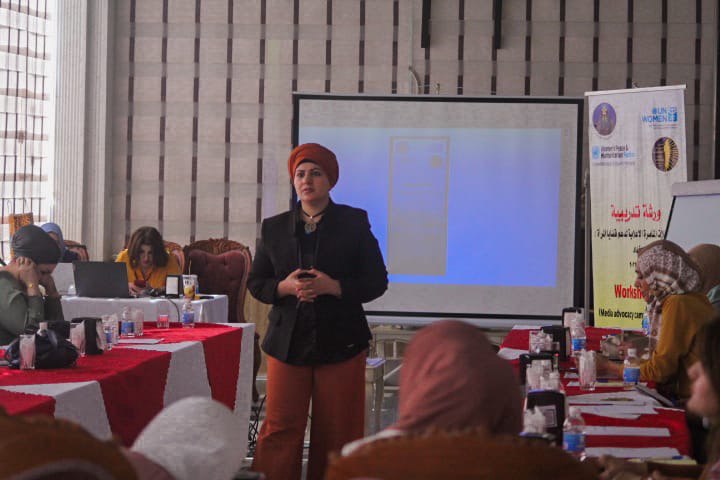Reaching marginalised groups of women to advocate change
Date:
There is a proliferation of misinformation throughout media, driving hate crimes, including racism and leading to increased violent crimes. Across the global female politicians are particularly targeted with hate crimes, and threats of violence on social media - Iraq is no exception. The relevance and importance of truthful and ethical journalism has never been so crucial to good governance, peace, and democracy. Well trained and ethical journalists have a major part in reporting truth and questioning the status quo. They play an important role in rebuilding Iraq into a more fair and equitable society.

Intikhab Adnan Mahmoud (48) is a qualified journalist and trainer who works with several civil society organisations. She works from her hometown of Baghdad and her experiences during the many years of conflict inform her sense of justice and fairness. Intikhab is married with four children and during the height of the sectarian violence the family had to flee as refugees to Syria where they spent eight years.
UN Women recognise the value of Iraqi women leaders to influence others to drive the necessary change that will move society towards greater democracy and equality. Support from international donors is crucial to train local civil society organisations (CSOs) and non-government organisations. UN Women’s provide comparative advantage with expertise and technical skills to support Iraqi women’s groups and empower them to drive the message among their own.
Intikhab spoke of the difficulties she and her family faced as a result of violence and conflict. “We faced many difficulties and challenges as refugees and then met similar challenges after we returned to our country,” said Intikhab. “I needed guidance and self-development to acquire the information that would help develop my skills in the areas of journalism and civil society activism. I required these skills to help me prepare to conduct advocacy campaigns for women’s issues. I gained those skills through my participation in several training courses held by the Iraqi Women Journalists Forum. This CSO facilitated Training of Trainers and they also organised advocacy campaigns to support women’s issues.”
Intikhab continued, “I acquired many skills through professional training and personal capacity building, keeping pace with modern technology when delivering training content. I became a member of the board of directors of the Women Journalists Forum where I was introduced to these courses.”
Intikhab believes that she benefitted hugely from the courses, learning new skills and updated methodologies, adapting and modifying some of the training principles and methods she previously used. The participants were taught how to reach out to oppressed groups of women who struggle to develop and become independent. “We learned how to advocate for abused women and persons with disabilities and how to target those groups by initiating advocacy campaigns and by training the participants on how to design those campaigns for their own life paths.”
Intikhab explained, “These courses made me think seriously about implementing special advocacy campaigns related to underage marriage, especially since I, myself, married at a young age and bore many responsibilities. Most of the participants are divorced women, underage married girls, or persons belonging to marginalized groups based on gender. I believe that we need more inclusivity for women with disabilities and provide them with training to enable them to implement advocacy campaigns themselves. These campaigns can help support their cause and the causes of women experiencing displacement, especially since I was a refugee myself.”